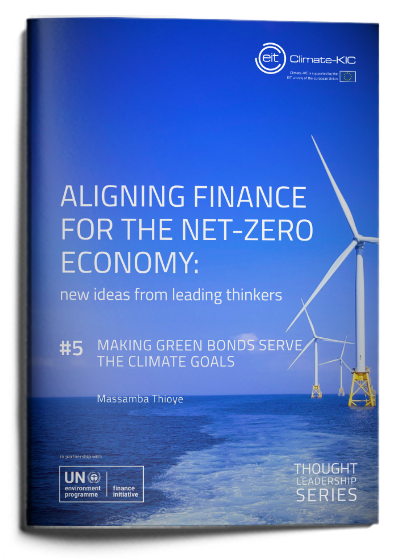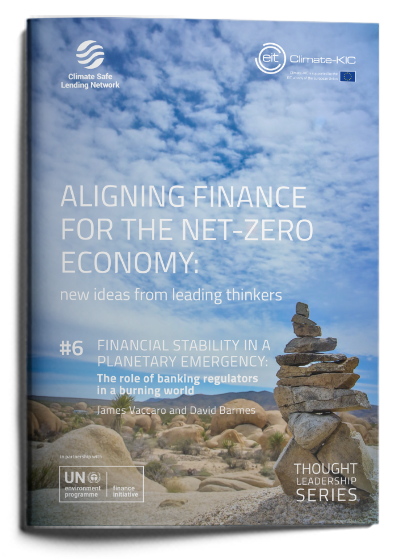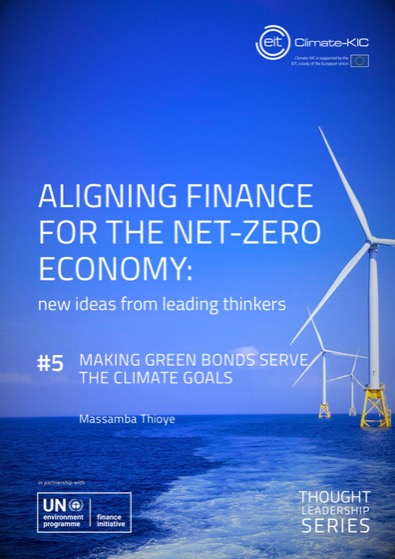UNEP FI has partnered with EIT Climate-KIC to bring the Thought Leadership Series, which presents papers from some of the world’s leading thinkers to help guide the financial sector towards a sustainable future. Our aim is to inspire financial actors worldwide to move from risk to alignment, challenge current assumptions around climate alignment and develop ideas and concepts on how alignment can best be achieved. We hope to convey to stakeholders that a proactive climate response is not only about disclosing risks, but also about investing in green opportunities that can enable the low emissions societies of the future. This series convenes innovators and industry experts to provoke discussion, challenge the status quo and accelerate the transition towards a sustainable economy.
The papers in this series will respond to a number of key questions:
- What economic system transformation is actually required to deliver the Paris Agreement?
- How do financial institutions achieve alignment with the Paris Agreement and how does it differ from transition risk transparency as captured in the TCFD?
- What is the future of financial institutions as a result of these changes?
- What are the various strategies and action tracks through which financial institutions can enhance and achieve full portfolio alignment?
- What are the pathways and choices needed for financial institutions and the financial system to drive an active transition to a net-zero carbon economy?
Following the launch of the first two papers in September 2020 and the third and fourth papers in December 2020, the fifth and sixth papers aim to address two key elements of the finance sector and how they can help deliver a low carbon economy.

Making Green Bonds Serve the Climate Goals
This paper proposes a reform of the current green bond framework to incentivize mainstream financiers to buy green bonds. Green bonds are a key tool to achieve the climate goal of limiting the global average temperature rise to 1.5 °C above pre-industrial levels. The author argues that a green bond framework should be (i) attractive to mainstream financiers for scalability and (ii) effective in enabling additional greenhouse gas (GHG) emission reductions. The paper identifies a lack of articles challenging the capability of the current green bond framework to address these two key attributes. To fill this gap, the author identifies five conditions for a use of proceeds (UoP) bond to serve the climate goal and therefore be labelled ‘green’.

Financial Stability in a Planetary Emergency: the Role of Banking Regulators in a Burning World
In the face of the climate change crisis, central banks and financial regulators are presented with the challenge of safeguarding financial stability and adapting their practices to manage environmental threats. This report outlines practical policies that regulators could adopt to address the needs of society and the planet. Rather than providing a review of existing literature on climate risks and financial policymaking, the authors suggest 10 cutting-edge proposals across 5 themes: managing systemic risks, regulating impact, managing credit out of fossil fuels and deforestation, greening portfolios, and regulating the just transition.
The authors state that while central banks and financial regulators should not be the leading institutions tackling climate change, their core objectives of price and often financial stability will not be achieved in the long-run unless they ramp up efforts to green the financial system. Regulators now also have a moral responsibility to support green recoveries from the COVID-19 pandemic. The report aims to explore the leadership roles of regulators and the implications for financial institutions to accelerate the transition towards a resource-efficient and inclusive economy.
Read the previous four papers in the series:
- Dr Ben Caldecott (University of Oxford): “Achieving Alignment in Finance” explores what climate alignment means for financial institutions.
- Dennis Pamlin (Research Institutes of Sweden): “Transformations Required for 1.5°C Alignment and Global Sustainability” takes a look at the actions needed to deliver a 1.5°C society.
- Richard Roberts& John Elkington (Volans): “Innovation and Transformation: What it will take to finance net zero” looks at how finance and the economy can transform to meet the Paris Agreement, with a particular focus on the 1.5°C Low Energy Demand (LED) scenario, as outlined in the IPCC’s Special Report on Global Warming of 1.5°C.
- Jakob Thomä & Anne Schönauer(2DII): “Finance 2030: A Time Travel Exercise” looks into the key characteristics that will shape the global finance sector in 2030.



